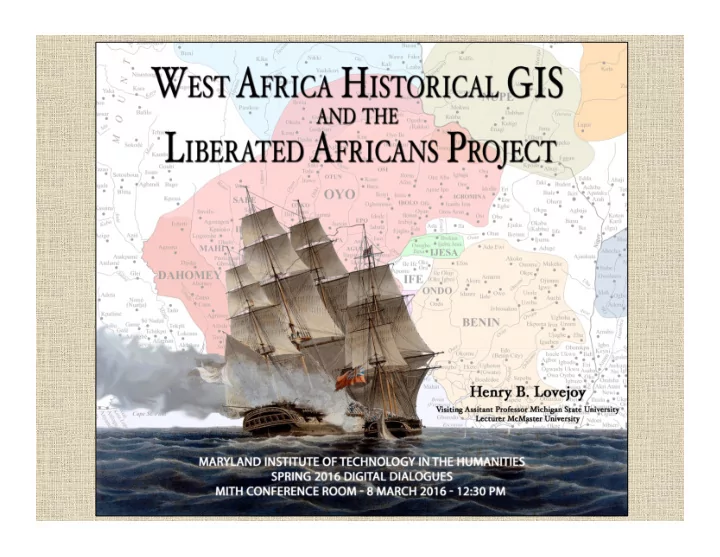

Sebastian Münster, 1554
Ramusio and Gastaldi’s Map: “Prima Tavola” (1563)
Willem Blaeu (1644)
“A map shewing the progress of, discovery & improvement, in the geography of North Africa” (1798)
John Tallis (1851)
Johnson’s “Map of Yoruba Country” (1921)
Fage’s Map: “States of the Guinea Forest and Savanna, XVIIth to XIXth Centuries”(1958)
Fage’s Map: “The States of the Sudan in the XIXth Century ”(1958)
Law’s Map: “The Oyo Kingdom at its Greatest Extent, c. 1780” (1977)
Oyo Empire at Its Greatest Extent, c. 1780 Canadian Journal of African Studies 47 (3) (2013)
The Oyo Empire and Its Neighbors, c. 1780
The Sokoto Caliphate and Its Neighbors, c. 1850
The Ascension of Ilorin and Owu Wars, 1817-1822
The Egba Crisis, 1823-1830
Oyo’s Collapse, 1831-1836
The Rise of Ibadan, 1837-1845
An estimated 268,000 Individuals Departed the Bight of Benin between 1816 and 1850 Approximately 28,000 Individuals died during the Middle Passage
www.slavevoyages.org
West Africa Historical GIS Data Sample ID Date 1 Date 2 Town Label X Y Cat Source 1 1800-01-01 1831-12-31 Igbeji BR3 323189 758532 Egbado Folayan, Egbado, 31-32 2 1832-01-02 1840-12-31 Igbeji BR3 323189 758532 Badagry Folayan, Egbado, 31-32 3 1841-01-02 1850-01-01 Igbeji BR3 323189 758532 Abeokuta Folayan, Egbado, 31-32 4 1800-01-01 1831-12-31 Erinja BR3 335756 751239 Egbado Folayan, Egbado, 31-32 5 1832-01-02 1840-12-31 Erinja BR3 335756 751239 Badagry Folayan, Egbado, 31-32 6 1841-01-02 1850-01-01 Erinja BR3 335756 751239 Abeokuta Folayan, Egbado, 31-32 7 1800-01-01 1831-12-31 Mokoloki HR3 375694 768329 Egbado Biobaku, Egba, 19 8 1832-01-02 1840-12-31 Mokoloki HR3 375694 768329 Badagry Biobaku, Egba, 19 9 1841-01-02 1850-01-01 Mokoloki HR3 375694 768329 Abeokuta Biobaku, Egba, 19 QGIS with Time Manager Plugin
West Africa Historical GIS Input from African universities and historians to build a massive geo-referenced database Requires an online GIS platform to ingest and collate data from primary (oral and written) and secondary sources Collaboration with programmers Interdisciplinary - Geographers advice on mapping uncertainty about populations with non-written histories Funding to build an online platform to link into other websites
Departures from the Bight of Benin to Brazil, Cuba and Sierra Leone, 1817-45 7,000 Brazil Cuba Sierra Leone 6,000 5,000 Individuals 4,000 3,000 2,000 1,000 0 1817 1818 1819 1820 1822 1823 1824 1825 1826 1828 1829 1830 1832 1833 1834 1835 1836 1838 1839 1840 1842 1843 1844 1845 1821 1827 1831 1837 1841 Ilorin and Egba Crisis Oyo’s Collapse Rise of Ibadan Owu Wars Individuals registered in Sierra Leone from the Bight of Benin after 1808, 21,000+ Individuals registered in Cuba from the Bight of Benin between 1826 and 1841, 3,500+ Individuals registered in Brazil from the Bight of Benin after 1830, 2,000+
www.liberatedafricans.org
Collaborators of the the Liberated Africans Project Sierra Leone (+150,000 individuals, 5 Courts and +600 Cases) Richard Anderson, Suzanne Schwarz, Henry Lovejoy Caribbean (+30,000 individuals, +5 Courts and 100 Cases) Henry Lovejoy, Maria del Carmen Barcia, Marial Iglesias Utset, Jorge Felipe, Randy Sparks, Sean Kelley, David Trotman Brazil (+14,000 individuals, +3 Courts and 50 Cases) Daryle Williams, Nielson Bezerra, Daniela Cavalheiro South Africa (+10,000 individuals, 2 Courts and 50 Cases) Patrick Harries East Africa (+10,000 individuals, +5 courts, 50 Cases) Matt Hopper United States (+3,000 individuals, +5 courts, 30 Cases) Sharla Fett St. Helena and Luanda (200 individuals, 2 Courts, 10 Cases) Consultants: David Eltis, Suzanne Schwarz, Randy Sparks, Walter Hawthorne, Steve Behrendt, Jane Landers, Olatunji Ojo, Ugo Nwokeji, Vanessa Oliveira, Katrina Keefer Programmers/Designers: Henry Lovejoy, Dean Rehberger, Lindsey Gish, Alicia Sheill
Relational Databases of the Liberated Africans Project Courts – Linked to a place, i.e. Freetown, Havana, Rio, etc… Cases – Trial records linked to a court, i.e. captured baracoons, canoes, slave ships (ships link to Voyages ) Registers of Liberated Africans (when available) – Linked to a case as well as Voyages , African Names Database, African Origins Individual Heroes or Life Events – Linked to a case, Registers of Liberated Africans, non-Trial Records, i.e. Apprenticeships reports, church records (baptism, death, marriage, etc...), resettlement records, military records, school records, court records (arrest, imprisonment, etc...) Court Officials – Linked to courts and cases (judges, arbitrators, secretaries, African interpreters, ship crews, etc...) Image Gallery – Linked to courts and cases by cataloguing prints, photographs, paintings and sketches of brandings and scarifications Legislation – Policies, procedures, treaties, rules, international law
http://kora.matrix.msu.edu
Correspondence from the Foreign Office 84 Series about the Suppression of the African Slave Trade, 1817-1900 Database currently lists over 30,000 letters the Foreign Office in England and British representatives, commissioners, naval officers, and other officials serving abroad. Over 5,000 Volumes Source: Daniel Domingues, University of Missouri
Foreign Office Correspondence about the Suppression of the African Slave Trade, 1817-1900 Source: Daniel Domingues, University of Missouri
African Names Database http://slavevoyages.org/resources/names-database
www.african-origins.org
http://eap.bl.uk/
http://www.vanderbilt.edu/esss/ 400,000 Documents across Latin America
Under Construction
www.slaveimages.org Among other prints, paintings, and photographs in Maritime Museums and personal collections
www.tubmaninstitute.ca/shadd
The Louisiana Slave Database www.ibiblio.org/laslave /
www.slavebiographies.org
Projects for Fugitive Slave Advertisements Freedom on the Move The Geography of Slavery in Virginia NC Runaway Slave Advertisements Runaway Slave Advertisements During the Revolutionary War Era Documenting Runaway Slaves (DRS) Louisiana Runaway Slave Advertisements, 1836-1865 Among others for North America, Latin America and the Caribbean
Manuelita 408 Lucumí Ecumachó
Negrito 328 Lucumí Elló
Conclusions on the Current State of DH Projects for the History of Africa and the African Diaspora 1. Currently in a period of mass digitization which requires new methods of organization beyond archival protocols 2. Open access and crowd sourcing 3. Standardizing and integrating the silos of information 4. Mapping uncertainty and interdisciplinary action 5. Funding and sustainability 6. DH certifications and credit/evaluation for faculty and students
Recommend
More recommend